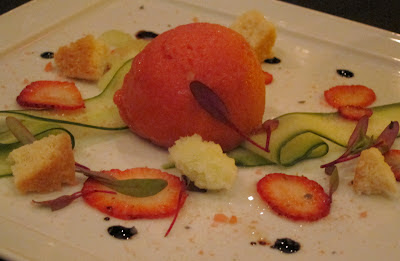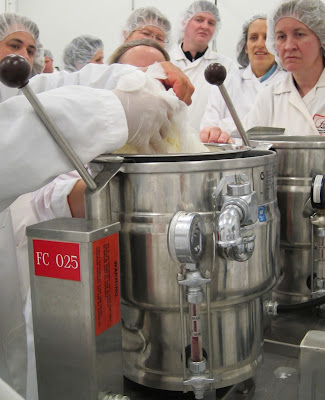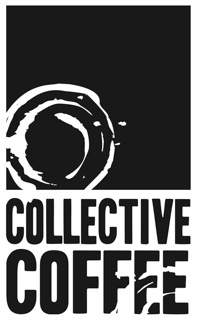What is Slow Food?
“Slow Food envisions a world in which all people can enjoy food that is good for them, good for those who grow it and good for the planet.”
The Opposite of Fast Food
When I left for the Slow Food Canada national meeting in Edmonton, I had a vague idea of what slow food was. It was the opposite of fast food – food gulped down rapidly at a drive-through burger joint – food eaten to stop the hunger pangs without giving any thought to what it tasted like or how it was made.
But that was a rather negative definition of slow food, and I was wrestling with the idea that promoting slow food made me into a food snob who turned up her nose at people who bought supermarket strawberries or used cake mixes.
Good, Clean, Fair
Slow Food began to make more sense to me as I listened to the Slow Food leaders from across Canada talk about their work to promote Slow Food. Paolo Di Croce, Secretary General for Slow Food International, emphasized that Slow Food is a political movement dedicated to ensuring good, clean, fair food for all.
Good Food – My day begins with two cups of fragrant oolong tea (my favourite oolong smells of lilac blossoms in springtime) and a bowl of cereal – chewy grains, crunchy nuts, tangy berries, and creamy yogurt. It’s simple and healthy but also a sensory delight.
At the national meeting, I tasted different kinds of honey from bees that had feasted on different seasonal blossoms – raspberries, alfalfa, sunflower, buckwheat – and they were all completely different. Alfalfa honey was the sweetest, but my absolute favorite was sunflower honey with its lingering floral aftertaste.
Good food is also rich in memories because it respects culture and tradition – your grandmother’s borscht recipe, Saskatoon berries growing wild on the Prairies, making cookies with your children.
Clean Food – It’s frightening to read about arsenic in children’s apple juice or antibiotics in commercial honey.
It’s deeply disturbing to know that, while millions of people are starving, increasing numbers of people are obese with a higher risk of disease, unable to enjoy simple pleasures like a game of tag with their children.
The earth is no longer healthy either. We are draining the rivers dry, destroying oxygen-rich jungles and grassland bird habitats, and unleashing chemicals without knowing what their impact will be on future generations.
Fair Food – For far too long, the focus has been on cheap food. We’ll spend hundreds of dollars on shoes, thousands of dollars on a new car or a new house, but we’re unwilling to spend $5.00 on a loaf of bread that was made by hand at 3 o’clock in the morning while we were still sound asleep.
We refuse to compensate the back-breaking work of farmers labouring around the clock in an effort to harvest their crop before it rains or anxiously watching the thermometer, wondering how they will pay the bills if frost destroys the blossoms on their fruit trees.
Game Changer
A blog post by Voula Halliday, co-leader of Slow Food Toronto, helped me to understand the political power of Slow Food:
“Slow Food is a counter-revolution. We are 100,000 members strong, around the world, and growing. Together we are an active community of citizens working to reverse the life threatening trends of industrialized food production. . . . As a counter-revolution to the idea that large scale is king, Slow Food is the game changer. We are united in the commitment to share and preserve knowledge that will benefit us all. We are an open-book, giving all people access to the true stories of where our food comes from. We know the difference between a direct short supply chain, from farmer to farmer’s market, versus the domino-like two- way industrialized food supply chain—from farmer, to processor, to distributer, to retailer, to consumer. We cherish the joys of sharing food grown by our own hands, the hands of our elders, the hands of our local farmers. We are grateful for this land and we protect it because without it we will die.”
It’s Fun Too
Serious stuff, but Slow Food members know how to have fun as well. There’s nothing better than sharing a meal with family and friends or experiencing the rush when your batch of jam or homemade yogurt turns out perfectly.
The barista’s artistry creates hearts and flowers on the surface of your latte, while chefs carefully assemble dessert plates that are almost too beautiful to eat.
Slow Food International
Slow Food is an international movement with over 100,000 members in 160 countries around the world. From its origins in Italy, it has spread around the world to include farmers, producers and consumers. It embraces farmers’ cooperatives in Mexico, traditional food celebrations in Uganda, and children’s cooking classes in Colombia.
There are 1,100 Slow Food members in Canada with convivia (local groups) stretching from coast to coast. Slow Food Montreal is Canada’s oldest and largest convivium. Other large convivia include Slow Food Calgary, Slow Food Edmonton, Slow Food Nova Scotia, Slow Food Toronto, and Slow Food Vancouver. But you don’t have to be a big city to have a local convivium. There are active chapters in Columbia Valley, Northumberland Shore, Southern Alberta, and many more. There’s a Slow Food Youth group in Calgary and Slow Food Kids in Thunder Bay.
Coming Soon to Saskatoon
Enough theory! What are we going to do? I have lots of ideas for fun events with the added whammy of changing people’s perceptions of food.







Comments
The last few years I have gone to 60% time at work, while my wife works full time. One of the advantages is that our family eats better. Not everyone has this luxury though. Because we have less income, we also eat out less. That means we're not supporting the local non-fast food restaurants very well. But, we do buy local much of the time and are enrolled in a community supported agriculture group so have a good supply of fresh veggies through the summer and on into the winter.
Cheers,
Bryan
The thing that strikes me is, as you said, our willingness to spend ridiculous money on brand name clothing, and luxury vehicles, yet our unwillingness to fairly compensate those who try to nourish us better. I will follow this with interest. Thank you for your good work.
Tracy Lalonde